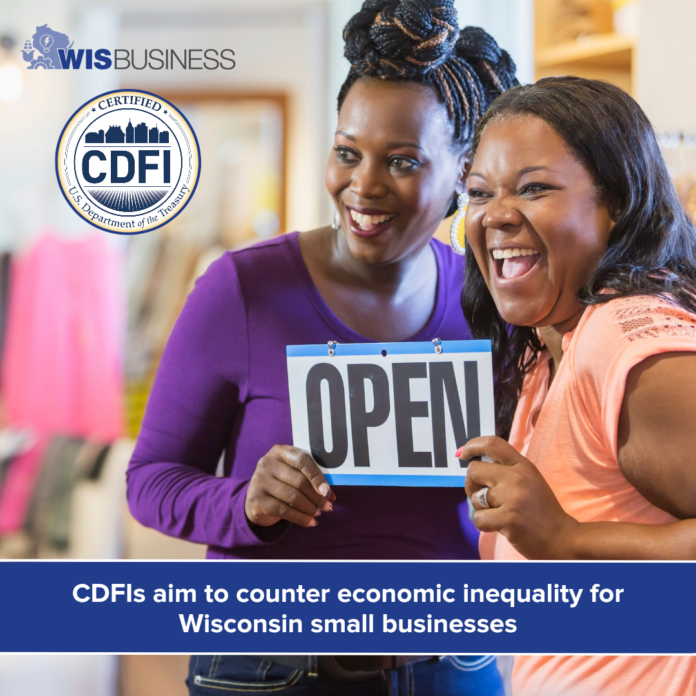CDFIs aim to counter economic inequality for Wisconsin small businesses
CDFIs aim to counter economic inequality for Wisconsin small ... Wisbusiness.com


Unconventional Lenders Empowering Wisconsin’s Small Businesses
Introduction
Unconventional lenders have emerged as a force to counter economic inequality within Wisconsin’s small business scene. These lenders, known as community development financial institutions (CDFIs), focus on empowering underrepresented individuals and supporting underserved communities. This report highlights the role of CDFIs in Wisconsin and their impact on small businesses.
CDFIs in Wisconsin
- The state of Wisconsin is home to 20 certified CDFIs, including the Brewery Credit Union, First American Capital Corporation, the Wisconsin Women’s Business Initiative Corporation, the Hmong Wisconsin Chamber of Commerce, and Impact Seven, Inc.
- CDFIs provide unconventional loans and financial services to individuals with limited or poor credit histories, adapting flexible lending guidelines to meet the specific needs of borrowers.
Challenges Faced by Small Businesses in Wisconsin
- Small businesses in Wisconsin face challenges due to economic hardship, particularly those owned by individuals from minority backgrounds.
- Wisconsin’s economy ranks 49th in racial equality among all 50 states, according to a study conducted by WalletHub.
Success Stories
Benjamin Clark, a Black small business owner, attributes the success of his business, GSI General Inc., to the support of CDFIs. Clark emphasizes the impact of CDFIs on his business, stating that they provided not only financial assistance but also guidance and encouragement.
Citlali Mendieta-Ramos, owner of Antigua Latin Inspired Kitchen, also credits CDFIs for helping her open and grow her restaurant. With the assistance of CDFIs, Mendieta-Ramos expanded her business to include wholesale and catering services.
Contribution of CDFIs in Wisconsin
- CDFIs in Wisconsin disburse nearly $500 million in loans annually to support small businesses, low-income families, and community development projects.
- Over 10,000 small business owners and 20,000 consumers in the state benefit from this financial assistance each year.
Challenges Faced by CDFIs in Wisconsin
- Wisconsin’s CDFIs struggle with limited budgets primarily funded by earned revenue.
- Philanthropic investments in CDFIs in Wisconsin have been slow to develop compared to national counterparts.
Advocacy and Funding for CDFIs
- The CDFI Coalition actively advocates for funding and supports the general interests of CDFIs through direct advocacy on Capitol Hill.
- Harnessing support from other key financial institutions is crucial for the success of CDFIs in Wisconsin.
Conclusion
CDFIs play a vital role in empowering small businesses and promoting economic equality in Wisconsin. Their unconventional lending practices and focus on underrepresented individuals contribute to the achievement of Sustainable Development Goals (SDGs), particularly Goal 8: Decent Work and Economic Growth. However, increased funding and support are necessary to further enhance the impact of CDFIs in the state.
References
- Wisconsin Bankers Association. (March 2022). Certified CDFIs in Wisconsin.
- U.S. Small Business Administration. (2022). Small Business Profile: Wisconsin.
- WalletHub. (n.d.). Racial Equality by State.
- Wisconsin Housing and Economic Development Authority. (2021). Wisconsin CDFI Research Study Report.
SDGs, Targets, and Indicators
1. Which SDGs are addressed or connected to the issues highlighted in the article?
- SDG 1: No Poverty
- SDG 8: Decent Work and Economic Growth
- SDG 10: Reduced Inequalities
The article discusses the economic inequality faced by minority entrepreneurs in Wisconsin and the role of community development financial institutions (CDFIs) in addressing these challenges. This connects to SDG 1, which aims to eradicate poverty, as CDFIs provide financial services and loans to individuals with limited or poor credit histories. It also relates to SDG 8, which focuses on promoting inclusive and sustainable economic growth, as CDFIs support small businesses and contribute to job creation. Additionally, the article highlights the disparities between Black and white residents in Wisconsin, indicating the relevance of SDG 10, which aims to reduce inequalities.
2. What specific targets under those SDGs can be identified based on the article’s content?
- Target 1.4: By 2030, ensure that all men and women, in particular, the poor and the vulnerable, have equal rights to economic resources, as well as access to basic services, ownership, and control over land and other forms of property.
- Target 8.3: Promote development-oriented policies that support productive activities, decent job creation, entrepreneurship, creativity, and innovation, and encourage the formalization and growth of micro-, small- and medium-sized enterprises, including through access to financial services.
- Target 10.2: By 2030, empower and promote the social, economic, and political inclusion of all, irrespective of age, sex, disability, race, ethnicity, origin, religion, or economic or other status.
Based on the article’s content, the specific targets identified are related to promoting equal rights to economic resources (Target 1.4), supporting entrepreneurship and job creation (Target 8.3), and promoting social and economic inclusion (Target 10.2).
3. Are there any indicators mentioned or implied in the article that can be used to measure progress towards the identified targets?
- Indicator 1.4.2: Proportion of total adult population with secure tenure rights to land, with legally recognized documentation and who perceive their rights to land as secure, by sex and by type of tenure.
- Indicator 8.3.1: Proportion of informal employment in non-agriculture employment, by sex.
- Indicator 10.2.1: Proportion of people living below 50 percent of median income, by sex, age, and persons with disabilities.
The article does not explicitly mention these indicators, but they can be used to measure progress towards the identified targets. Indicator 1.4.2 measures the proportion of the population with secure tenure rights to land, which is relevant to Target 1.4. Indicator 8.3.1 measures the proportion of informal employment, which is relevant to Target 8.3. Indicator 10.2.1 measures the proportion of people living below a certain income threshold, which is relevant to Target 10.2.
Table: SDGs, Targets, and Indicators
| SDGs | Targets | Indicators |
|---|---|---|
| SDG 1: No Poverty | Target 1.4: By 2030, ensure that all men and women, in particular, the poor and the vulnerable, have equal rights to economic resources, as well as access to basic services, ownership, and control over land and other forms of property. | Indicator 1.4.2: Proportion of total adult population with secure tenure rights to land, with legally recognized documentation and who perceive their rights to land as secure, by sex and by type of tenure. |
| SDG 8: Decent Work and Economic Growth | Target 8.3: Promote development-oriented policies that support productive activities, decent job creation, entrepreneurship, creativity, and innovation, and encourage the formalization and growth of micro-, small- and medium-sized enterprises, including through access to financial services. | Indicator 8.3.1: Proportion of informal employment in non-agriculture employment, by sex. |
| SDG 10: Reduced Inequalities | Target 10.2: By 2030, empower and promote the social, economic, and political inclusion of all, irrespective of age, sex, disability, race, ethnicity, origin, religion, or economic or other status. | Indicator 10.2.1: Proportion of people living below 50 percent of median income, by sex, age, and persons with disabilities. |
Behold! This splendid article springs forth from the wellspring of knowledge, shaped by a wondrous proprietary AI technology that delved into a vast ocean of data, illuminating the path towards the Sustainable Development Goals. Remember that all rights are reserved by SDG Investors LLC, empowering us to champion progress together.
Source: wisbusiness.com

Join us, as fellow seekers of change, on a transformative journey at https://sdgtalks.ai/welcome, where you can become a member and actively contribute to shaping a brighter future.








